TRANSFORMERS ONE: HOW TO PUT SUBSTANCE OVER STYLE GUIDES
[OPEN SPOILERS AHEAD!]
if you've been following the site for any amount of time, you already know how much of a Transformers fan i am. there's a whole zone that more-or-less exists as an excuse to house that particular hyperfixation, after all. for as much as i've covered my relationship to Transformers as a toy, though, i haven't really taken a lot of swings at covering Transformers as a rich multimedia fiction. part of that is that i have a number of blind spots - i've heard great things about the comics, whether they're IDW or Skybound, but i'm not much of a comic reader, and while the premise of the latest television incarnation EarthSpark intrigues me, i haven't set aside the time or wrangled the right streaming service to check it out. another matter at play is how i tend to engage with Transformers stories. there's a certain set of expectations that comes from a franchise designed to sell toys, and while i could and one day may whip together some good deep reads on something like Transformers Animated, a lot of these stories don't readily lend themselves to the type of analysis i enjoy writing. Transformers, to me, is often more suited to a deep TFWiki trawl and a conversation with friends about the weird and unexpected corners of this 40-year tapestry. perhaps one day i'll figure out how to wrangle that into an article, if the interest is there, but one could say it'd be an alternate mode of writing for me.
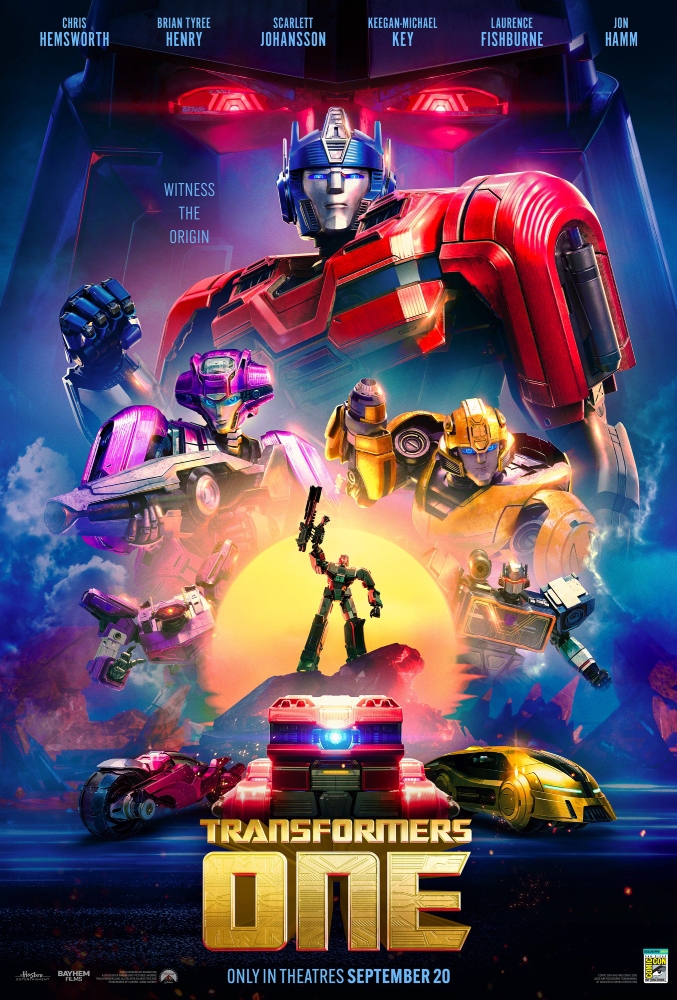
for once, though, i have a way in. a way to get down to the core of what makes Transformers tick, not just as a toy, but as a story, a world, and a set of characters. and i don't even have to write about multiple seasons of television or years of comics to get it to you! for what is shockingly the first time since all the way back in 1986, there is finally a new fully animated Transformers movie - the somewhat confusingly named Transformers One.
One lands in 2024 as something of an impromptu 40th anniversary celebration, and as a culmination of a lot of different ideas. for starters, it's a long-held belief within the fandom that Transformers might be better off without humans, if it could zero in on the mythos and grandeur of these larger-than-life mechanical beings and their struggles. it's an issue i've been on both sides of over the years, and at least for now, my stance is that it really comes down to the writer and their goals. yes, there's certainly been shallow human characters in Transformers history, but often times, when these stories lack that human presence, it's made up for by injecting more humanistic traits into Cybertronian life. Transformers One stands as the long-awaited "what if they made a movie that was just Cybertron stuff", and... yeah, case in point, it's a very humanistic take on these characters and their world, both in terms of little cultural flourishes and its broader approach to character-building.
another culmination at play here is the hilariously overdramatically named Binder of Revelation. it's a long story, but to try and make it short - at the turn of the 2010s, fresh off the explosive success of the live-action Transformers films, Hasbro pivoted their approach how they managed their various brands. story had always been a component of Transformers, yes, but now Hasbro saw themselves as a story company just as much as a toy company. in trying to bring together decades of disparate takes on Transformers, Hasbro had their story team draft up a 354-page binder that would become the new 'default' Transformers lore. no more pulling together a loose net of names and iconography every time there was a brand refresh - if you were a media company working with Hasbro to make something Transformers, this was the new bedrock you'd be building off of.
having a story bible like this for a big brand really isn't that weird, but what was perhaps a little out of the ordinary was how proudly Hasbro touted this thing, making big promises at fan conventions about how the next decade of stories would fit together on one timeline, albeit with some amount of wiggle room required. the resultant 'continuity family' - unofficially dubbed Aligned, if only because Hasbro refused to put a hard label on it and kept using that word - ran through media like the High Moon Studios games and Transformers: Prime, but the goal of tightly knit, non-contradictory storytelling seemed to become a lower priority year over year as new iterations of the brand emerged.
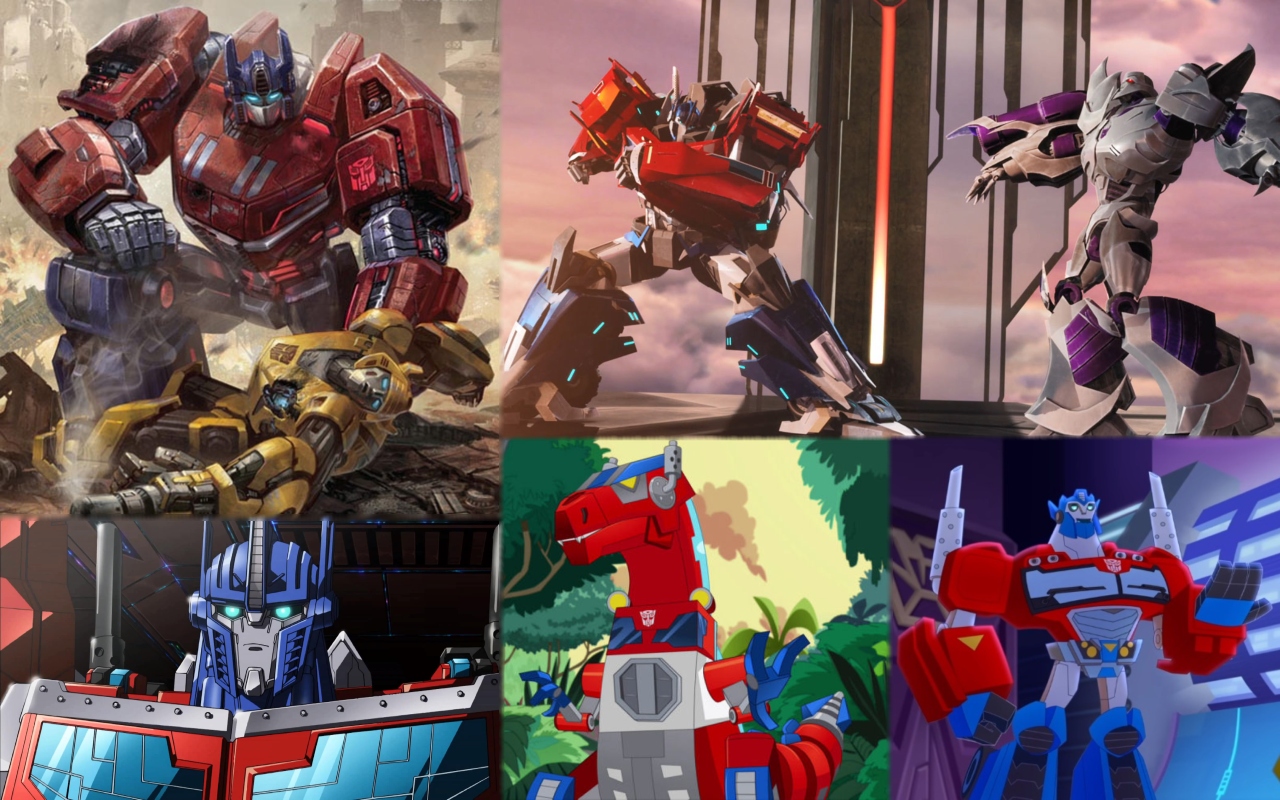
there are a lot of people - including some of the writers back at Hasbro home base, who seemed slightly bitter about the messy autonomy of these projects' writers wanting to go in different directions as they found their own individual creative voices - who will tell you that the Binder of Revelation and its Aligned continuity initiative failed. the shows flickered out one-by-one, getting increasingly incompatible with each other and stopping literally two days shy of that 10-year benchmark with the preschool-aimed Rescue Bots Academy, all while multiple new and even more disparate reboots flourished.
and i mean, if your metric for success is 10 years of uninterrupted storytelling free of any continuity errors, i guess it came up short, but i don't think that was ever truly the metric. it was easy to talk a big game, but when it comes down to it, the Binder absolutely did its actual intended purpose of codifying a brand identity, and still does to this day. the modern landscape of Transformers media isn't homogeneous, or all intended to fit together perfectly, but you can draw a pretty clear line in the sand around 2010 where a lot of the broad strokes get nailed down.
to use the aforementioned TFWiki as a bellwether, let's look at Optimus Prime's disambiguation page and dip our toes into some of the different takes on the character. you have the humble basketball-shooting father figure of the G1 cartoon, the guilt-ridden commander of the concurrent Marvel comics, the blue collar academy washout turned superhero of Earth from Animated, and that's all without getting into things like the Unicron Trilogy or 2001's Robots in Disguise, which you could probably argue count twice over because of differences between the original Japanese versions and their imported counterparts. there's absolutely common ground between all of them - red and blue, turns into a truck, iconic good guy - but they're distinct characters in distinct stories, shaped by their own distinct backgrounds.
then, you get into more modern interpretations of Optimus - across Prime, Cyberverse, EarthSpark, and even some of the more recent reinterpretations of G1, such as the IDW comics or the War for Cybertron Netflix series. they're all still distinct characters in distinct stories, but they share a pretty common launchpad. a tale of a tragic friendship gone wrong with Megatron, a divide over idealism vs. extremism, and a very tightly carved niche in Cybertronian mythology thanks to the introduction of 'the Thirteen', a sort of pseudo-Greek pantheon of robotic demi-gods who contextualize that whole Matrix of Leadership schtick. this type of standardization is commonplace across the board for basically the entire stable of franchise regulars, and i would argue that recurring faces across, say, Cyberverse and EarthSpark, sometimes tend to have more in common as broad archetypes than some of the incarnations that categorically get lumped together under G1. they may not hype it up as the Binder of Revelation anymore, but the alignment absolutely did its job.
for a long time, though, even with this narrower set of worldbuilding guidelines, all of this was more style guide than story. even the prequel-ist of prequels tend to start a little bit past the breaking point between Optimus and Megatron, leaving their strained relationship as more of an interesting factoid than a tale with its own beginning, middle, and end. at best, if you're dealing with an especially long-form medium like comics, they might eventually go back and fill in the gaps, but these moments are often tinted pretty heavily by the accumulated creative tone of whatever run you're reading - across IDW's two major continuities alone, Megatron was interpreted both as a revolutionist worker who's manifesto kickstarted the Decepticons and a senator puppeteering a paramilitary death squad to undermine Autobot law from the inside.
so, in a very real sense, Transformers One is the culmination of what the Binder of Revolution set out to achieve almost 15 years ago. it finally takes all those outlines and ideas, all that context and background noise, and shapes it into a proper narrative, one released through the much more marketable medium of film. director Josh Cooley even mentions in an interview with IGN that he was given 'the bible of Transformers' (describing it as 'Tolkien-style' and 'huge') while doing his own pass over the film's first draft - if not literally the Binder of Revelation, then certainly whatever new form it's taken over the past few years.
from here on out - until they decide to do it all over again - kids and new fans and even oldheads like me can sit down and watch a movie that is THE story of how Orion Pax and D-16 became Optimus Prime and Megatron. perhaps not THE story in a literal sense that makes it compatible with every other story, but almost certainly THE story in every way that actually matters to Hasbro, like brand image or whatever.
so, did they pull it off? yeah, mostly, i think! maybe it's a bit of a mixed bag, but it's alright. i think if you go in with your expectations set a solid two or three notches down from a full-blown Spider-Verse, you'll probably have a pretty good time? probably?
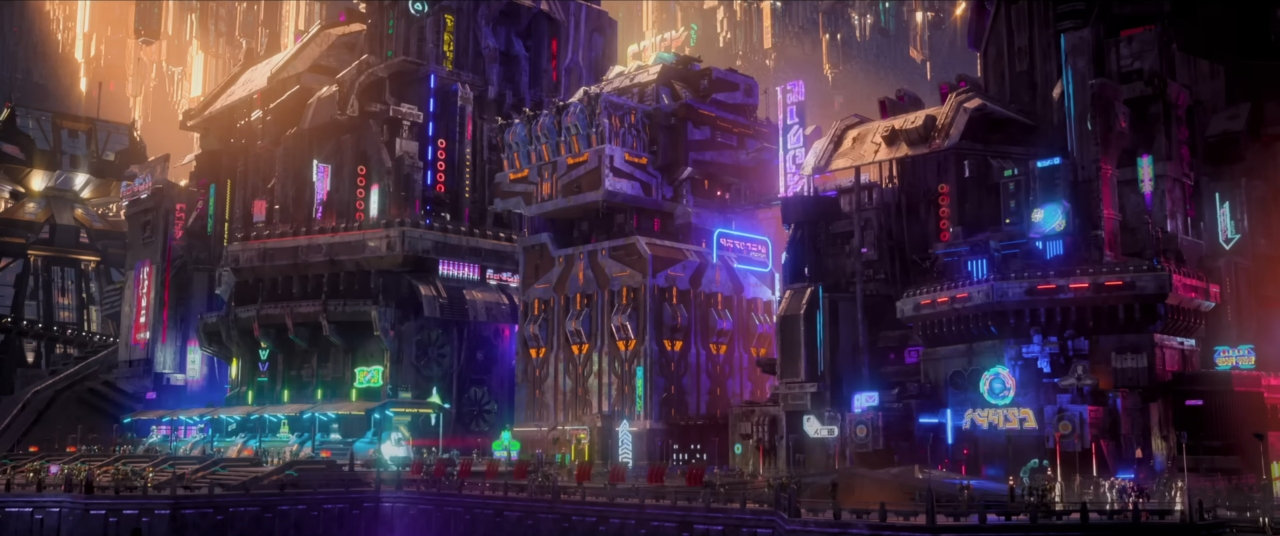
for being the first fully animated Transformers movie in almost 40 years, and undoubtedly our biggest, most extensive, and most expensive look at pre-war Cybertron yet, i think One looks pretty good. it's not going to change the industry or anything, but it finds a nice stylistic niche, bringing a world of metal to life with a colorful chrome shine that almost starts to evoke the airbrushed artwork of the G1 toyline at moments. there's a nice contrast set up between the decadent underground city of Iacon and the harsh overgrown wilderness of Cybertron's surface, and while i would have appreciated maybe a bit more time to linger in these settings, they do sprinkle in just enough distinctive moments to give the world some depth and flavor, whether it's the perilous self-repairing tunnels of the Energon mines or the levitating panels that swoop into frame to form last-minute roads ahead of vehicles.
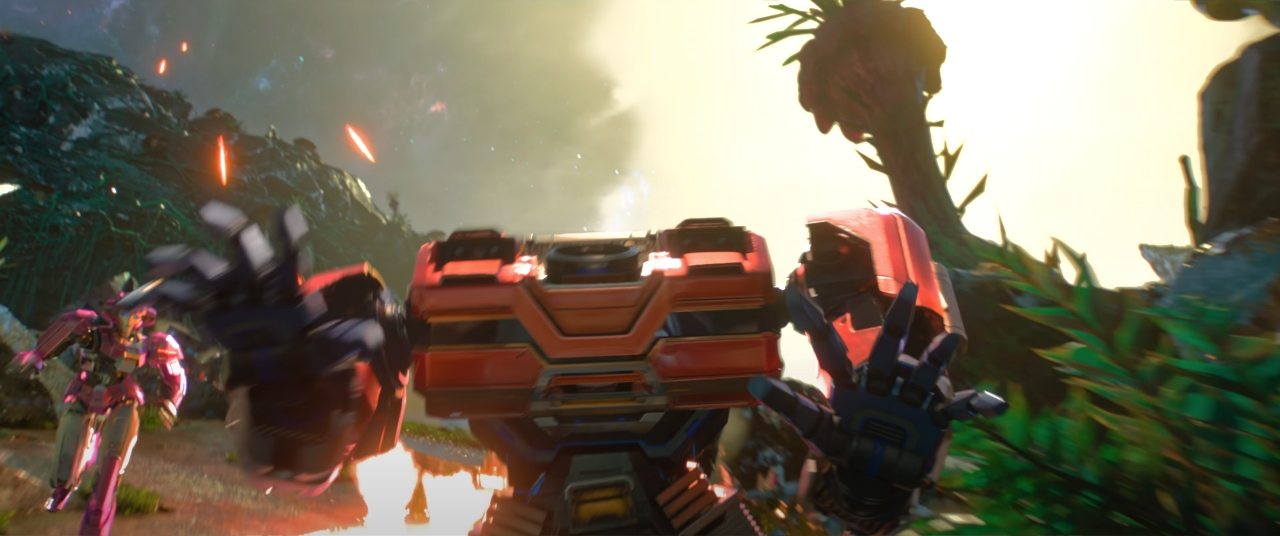
i also appreciate that the animators clearly kept the characters' mechanical nature in mind and had fun with it - as our characters first unlock their alternate modes, they clumsily deploy them in half-formed shapes that feel like authentic half-transformed toys, but you can see them master that balance scene-by-scene until you reach the point where full fight scenes are spent fluidly incorporating both modes, sometimes in a sort of halfway deployed tandem, with some of the most creativity i've ever seen out of Transformers. some of the big bombastic third act action can get a little hard to follow, but overall, i do think this movie looks very nice, with its own visual language that evokes franchise history without feeling overly weighed down by tradition.
another important facet of bringing the characters to life lies in the movie's voice cast, and it... sure has one. they went for the unfortunately all too common method of casting big celebrities over more seasoned voice actors, and while i don't think anyone did particularly bad, i often found it was a little hard to let the characters wash over me when they were so clearly Scarlett Johansson or Keegan-Michael Key. i will admit Chris Hemsworth did manage to tap into some of the classic comforting gravel you want out of Optimus, but only fleetingly towards the end of Orion Pax's arc, in a way that makes me wonder how i'd feel about that matured performance if we get a whole movie of that. the two real heavy hitters on the cast are Brian Tyree Henry as Megatron - fitting, given his history as part of the cast of Spider-Verse - and Jon Hamm as Sentinel Prime. the dynamic between their characters is one of those make-or-break things, and i think they both pulled their weight and then some in selling the big turns their characters take.
so, where to start with those big turns? from here on out, we're running down the whole thing. spoilers abound, so you've been warned.
the movie opens on a Cybertron caught in a dire downswing, as a war with Quintesson invaders has left the Thirteen Primes dead and the flow of Energon dry after the mysterious disappearance of the Matrix of Leadership. the Transformers now live in the underground city of Iacon under the rule of Sentinel Prime, mining for the last traces of Energon while their king leads expeditions to the blighted surface to hunt down the Matrix. the story quickly focuses in on the two bots who'll go on to become Optimus and Megatron - Orion Pax and D-16, miners without transformation cogs two best friends living shift-to-shift.
i appreciate One's choice to get directly to the point, in part by trimming away some common window dressing like D-16's gladiator background, but largely just by starting us off with these two already being close companions. it really lets their dynamic flourish quickly, with Orion as an unexpectedly brash rulebreaker who dreams big and tries to take the quest for the Matrix into his own hands, while D-16 is much more grounded in his lot in life, taking pleasure from the little things in Cybertronian culture and trying to hold back Orion's impulses. their banter might be a little predictable at times, but i think this pairing works, especially from little moments like Orion gifting D-16 a suspiciously familiar decal of Megatronus, 'the strongest of the Primes'.
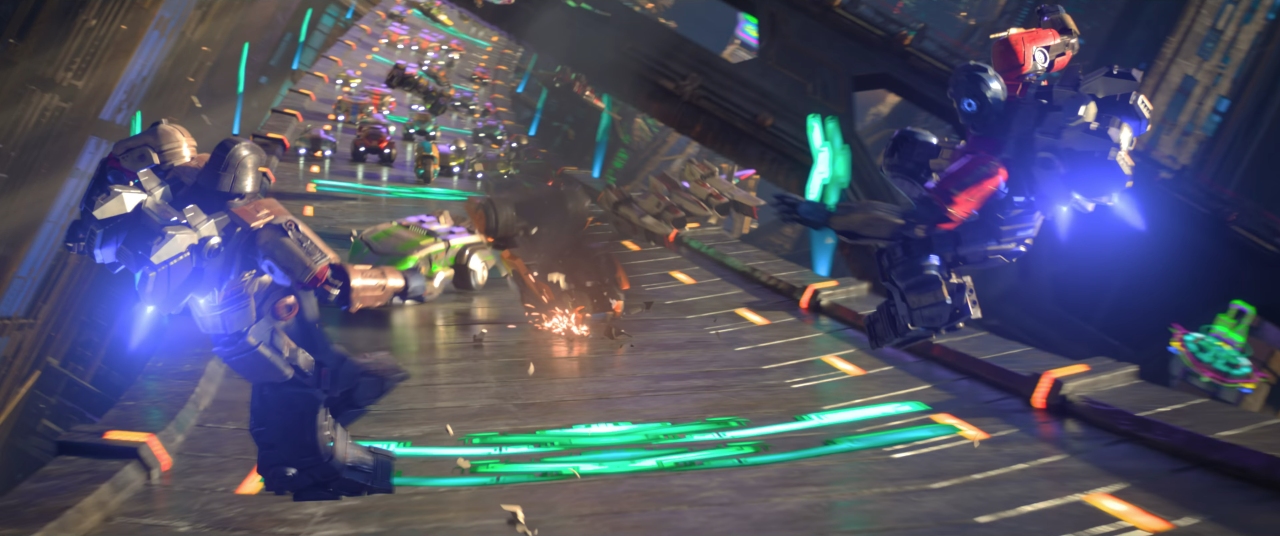
after a mining collapse - where Orion opts to push his luck saving a co-worker - gets their supervisor Elita fired, the gears really start turning when he decides to infiltrate the Iacon 5000, a grand prix running throughout the whole city. Orion brings D-16 along to enter the race despite their lack of alternate modes, in the hopes of proving themselves despite their lower caste. it's all very Blue Sky's Robots, with all sorts of mechanical traps and fun action setpieces and that same surprising underpinning of class warfare. they come just shy of winning, but their performance still seems to impress Sentinel Prime - although in our first real glimpse at the bot on even footing with his citizens, he seems more excited at the prospect of marketing the two as working class heroes in a bid to increase productivity in the mines. interesting brand of sinister going on there.
unfortunately, whether by accident or 'accident', Orion and D-16 find themselves punished anyways, sentenced to an underground furnace/cubicle where they meet the eccentric and talkative B-127 (nobody says the word 'Bumblebee' in this movie, but... that's Bumblebee). given Bee's relative lack of a character arc in this movie, i'll say now that... he's fine, i think? i dunno. he has two or three recurring gags throughout the movie that get a half-laugh out of me, and he is very much Keegan-Michael Key doing the Keegan-Michael Key voice. there are times when there's a sort of elastic tension to this increasingly weighty story having to accommodate comic relief, but he meshes in well enough into some of the story's key moments. he's fine. capital-f Fine.
in the detritus of Bee's workspace, the three stumble upon an SOS from Alpha Trion, one of the Thirteen Primes. i'm sure people will complain about this being awfully convenient, and like, yeah, but... movies have plots and things happen. tale as old as time. with the hopes that the coordinates on the SOS will lead them to the lost resting places of the Matrix, Orion, D-16, and Bee wind up onboard a train heading for the surface, alongside Elita, initially in hot pursuit with a grudge over her demotion earlier but quickly acclimating as something of a team leader when she realizes the importance of the task at hand.
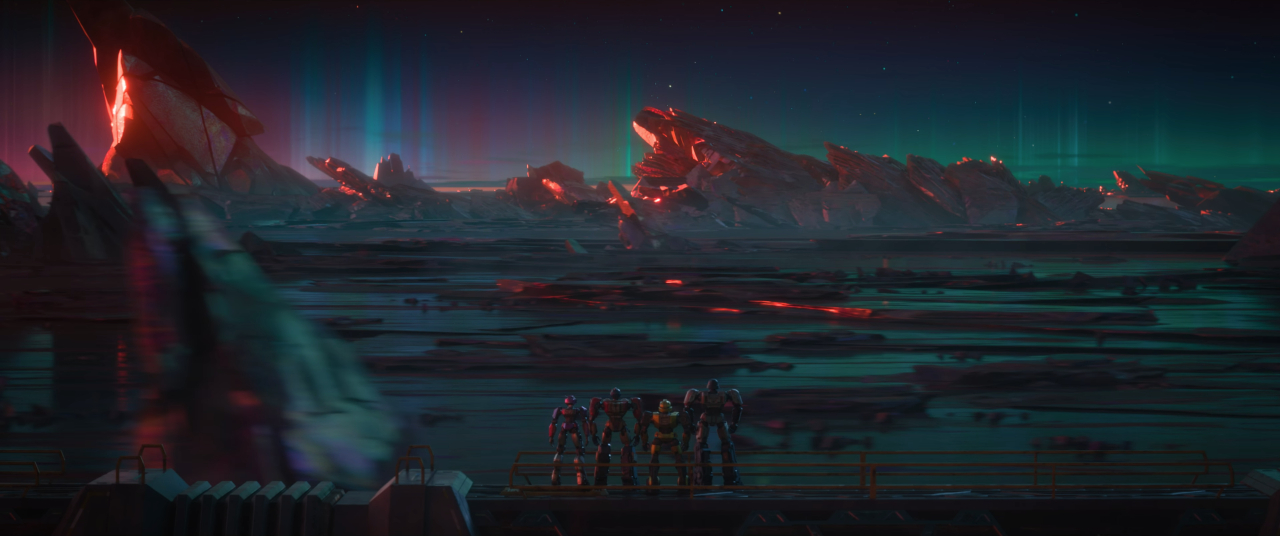
the surface of Cybertron feels delightfully weird in a way that One never quite takes the time to fully parse. this is something that sticks out at me a lot in this particular leg of the journey - the lack of explanation can make things seem otherworldly and intimidating, but it's hard to tell how much of that mystique is intentional and how much of it is a byproduct of a very tightly paced script. the landscape seems actively hostile, the planet itself forming massive shifting crystalline mountain ranges that derail Energon shipments, and parts of it are even covered in organic nature, presumably from years of wear and tear. the cyber-deer are one of the weirdest of these touches to me - they're much more organic-looking than proper Transformers, but they're also clearly mechanical, with antlers lighting up like radio antennae to alert them of danger. are these like... new? do Orion and D-16 know what they're looking at? did there used to be a much richer Cybertronian ecosystem? none of this really matters, but it does build a very distinct atmosphere.
we don't have time to linger on the cyber-deer, though. the cyber-deer's been exploded! by a passing Quintesson ship, itself looking much more alien and borderline organic than usual, silently scanning for any life on the surface and orbital striking even harmless fauna. i'm a big fan of the Quintessons and their decidedly weird place in Transformers lore, and i'd say their presence in One is probably the hardest to pin down when it comes to the question of 'alien mystery' vs. 'underutilized element'.
as the crew evades Quintesson detection, they find themselves at the end of their map, in the final resting place of the Primes. Alpha Trion is in some kind of suspended stasis mode, but a bit of Energon awakens him from his slumber, ready to dole out a hearty dose of exposition.
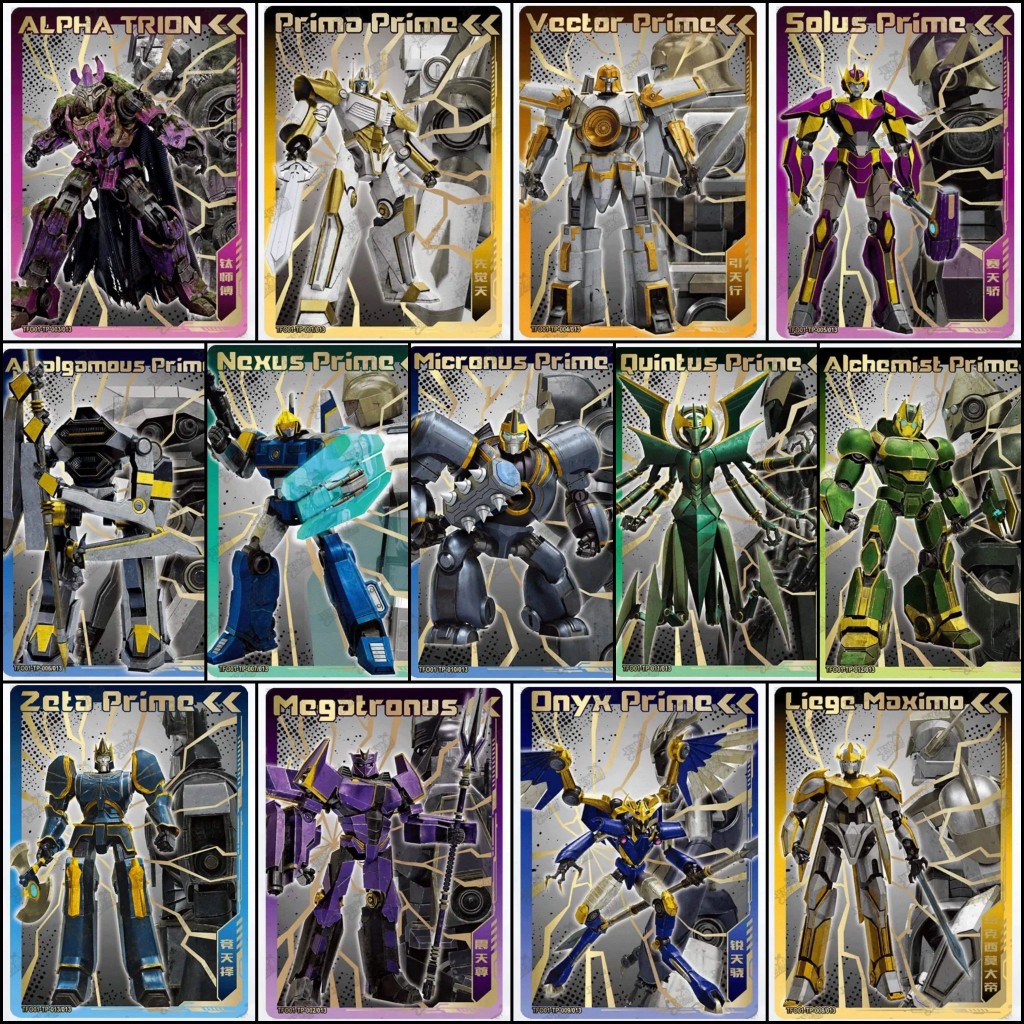
as a sidebar, since we're in their tomb and all - the Thirteen Primes are here! (please excuse the fact that the best and basically only view i've got of them is on these Chinese trading cards - this is all being thrown together before anyone can just go scour the film frame-by-frame for them.) in most Transformers stories, i don't especially like the Thirteen. i think that their mythos is dull, clumsily peeling concepts from real-world religion and mythology to try and inject unearned gravitas into the franchise. they're often deployed to answer questions like "why are some Transformers small/animals/women", which i think is incredibly boring and reductive and unnecessarily dignifies a very specific type of nitpicking. most of all, though... these are robots we're talking about, and i think you open up a lot more doors by leaning into the complexities of their mechanical nature rather than away from it. in Transformers One, however, a lot of my big issues with them kind of fade into the background. as far as the movie portrays it, we don't have to suffer through any of the pseudo-religious melodrama that usually tints their characterization, and they might not even really demigods or whatever - they're certainly powerful, whether that's Alpha Trion's ability to do cool magic sand projections or Megatronus's cog seemingly turning its wielder into a walking artillery platform, but those abilities read much more as 'especially powerful machines' than 'pre-destined forces of nature'. they have a bit more of a Knights of the Round Table vibe to them that i find a lot more palatable.
enough of my griping, though, and more about what actually happened to these guys - the truth is Sentinel is nothing but an advisor who betrayed them, selling them out to the Quintessons in exchange for being allowed to rule Cybertron. on top of this, the Matrix of Leadership wasn't lost, but rather seems to have self-destructed of its own 'will' (or Primus's?) to prevent Sentinel from getting his hands on it. none of this comes across as especially shocking for a long-time fan like me, given that Sentinel's modern portrayals are, at best, ineffectual egomaniacs who regularly endanger others with bad decision-making. i don't even think it's that shocking for people who might be introduced to the character through One, given his smarmy demeanor and the fact that he hangs out with a giant spider lady named Airachnid. nonetheless, i think the flashback that Alpha Trion illustrates sells the turn nicely, with a surprisingly brutal fight between Sentinel and his former friends.
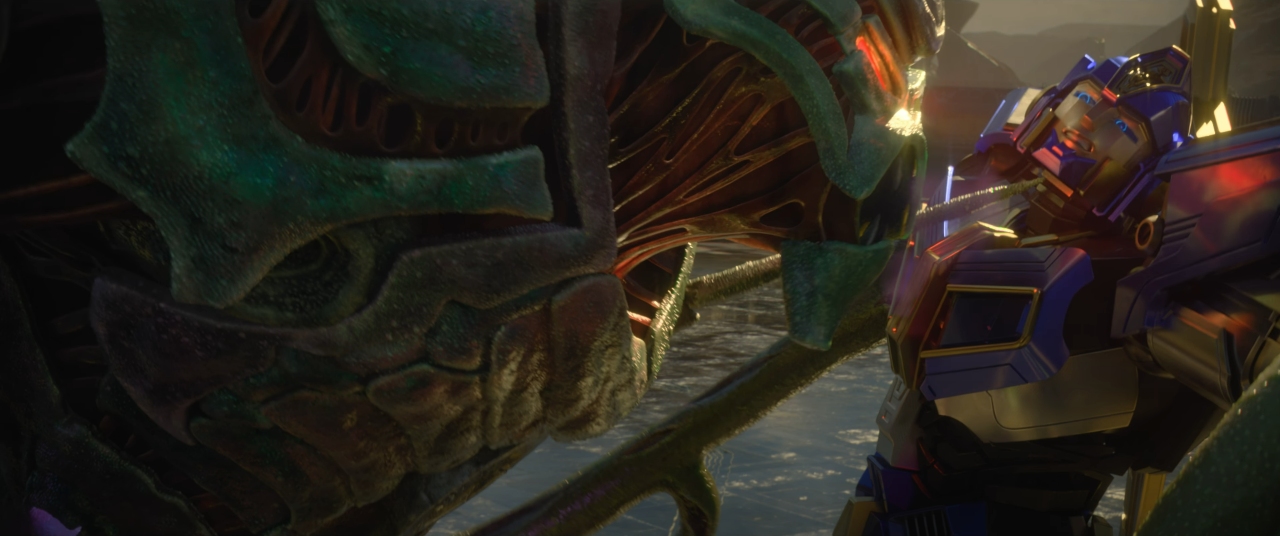
and, with perfect timing to remove any doubt from our heroes' minds as their world is turned upside-down, both Sentinel's expedition and the Quintesson fleet arrive for a meeting in the Cybertronian plains, giving us our only good look at one of the tentacled aliens as he nearly draws and quarters Sentinel for falling short on his Energon deliveries. not only are the mines that Orion and D-16 have devoted their lives to being used to pay off Cybertron's worst enemy, but it's a debt Sentinel can barely even keep up with, as the planet's supply dwindles and his quotas get increasingly out of hand. the movie really doesn't linger too long on any of this, instead smartly focusing on the material impact of what this means to our protagonists rather than the intricacies of Sentinel's deal, but it really only takes one clear-cut moment like this to demonstrate how his kingly behavior is masking how much his authority is predicated on a bad deal hanging on by a thread.
as if Sentinel wasn't firmly established as a traitor enough yet, Alpha Trion drops one last bit of wisdom on the heroes - the caste system is a problem of Sentinel's own creation, as he's been stealing transformation cogs from Transformers before they come online. with their worldviews thoroughly shattered and morale at an all-time low, we get what i think is one of the most crucial scenes in this whole film, as the pace gets to slow down for a minute and really savor the inner workings of these characters. it's a bit of a pain to grab transcribed dialogue for a movie that's still currently running in theaters as i write this, but thankfully, TFWiki has helpfully caught the important boiling-over point for me -
ORION PAX: I'm not thinking about what he's going to do, I'm thinking about what we're going to do.
D-16: That's the whole thing! You're never thinking about anything else, just yourself. Fantastic! Another Orion Pax master plan! I can't wait to hear this!
ORION PAX: Don't you want to stop him?
D-16: NO, I WANT TO KILL HIM! I wanna put Sentinel in chains and march him through the mines so everyone can see him for the false Prime that he is! I want him to suffer, and then to die in darkness.
up until this point in the film, i felt like i was still trying to settle into a groove with how they were portraying these characters. i enjoyed Orion and D-16's friendly banter, i felt like there was a connection there, and i wasn't disliking them, but i wanted to see the vision for this particular take on this particular story. i know these guys become Optimus and Megatron, but what's gonna be the 'how' and 'why' here?
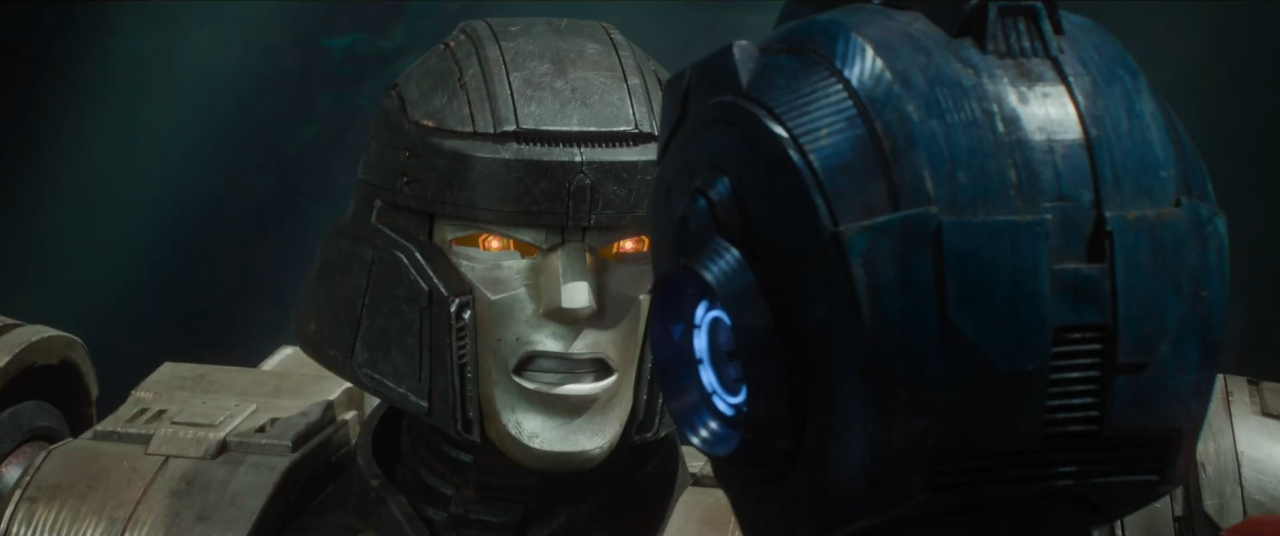
D-16's arc is far from over and i'll have a lot more to dig into as he delves deeper into these dark impulses, but this exchange really brings things into focus. Orion's immediate instinct is that people need to know the truth, even if it's going to be difficult, but D-16's train of thought quickly turns inward with a pretty wild yet somehow very natural, congruent, and believable flurry of emotions.
throughout the whole movie, D-16 has been chronically subservient to the rules in a way that really camouflages what he'll inevitably become. he's the responsible one, reining in Orion's wild plans and worrying about the consequences. what this conversation ultimately shows us is how much that comes from a deep place of selfishness and fear within him. just before the particular dialogue snippet i've been able to present, he posits that maybe he'd be happier if he never knew the lies his life's been built upon, content to live a life of ignorance in Iacon. then, that turns to fear - if he knows all this now, what danger does that put him in? and then, underneath it all, when confronted very directly with the responsibility he and Orion now share to set things right, there's that sheer violent impulse bubbling up to the surface. the writers do a really fantastic job with this particular thread, in my opinion - D-16 is already prone to some notably violent language throughout the first act, but in kind of a buddy-buddy "i'm going to kick your ass, dude" kind of way. when he flat-out breaks and fantasizes about torturing Sentinel, it's still in line with how he's been acting this whole time, but it's also offputtingly visceral in a way that sucks the air out of the room.
it'll probably be fine, though, right? especially when Alpha Trion, seeing the potential for these four to finally put an end to Sentinel's rule, grants them some of the transformation cogs of his dead comrades. he gives a nice monologue to tie some of these thematic elements together, putting forward that the cogs are not just about the literal change of turning into a truck or a jet or whatever, but also a representation of one's ability to affect change upon the world around them, to overcome circumstance and build their own future. it's a nice way to give this moment some narrative oomph beyond just making everyone bigger and cooler and easier to make toys of.
unfortunately for our heroes, Airachnid has clocked that Sentinel's meeting is being watched and forces the group into a hectic and clumsy escape with their new vehicle modes, while she and her Death Tracker drones (drones? i think? they certainly don't seem to get treated the same as full-fledged 'people' in this movie) subdue and capture Alpha Trion. shortly thereafter, between scenes of growing friction between Orion and D-16, we get to see the last survivor of the Thirteen brought before Sentinel, giving us one of our better views of his side of the story. Sentinel makes a big point of telling Airachnid his point of view - in his eyes, the Primes wasted their time waxing poetic and affirming their code of honor to each other as the war against the Quintessons slipped out of their grasp. as a noted critic of the whole Thirteen concept, i do have to admit i was nodding along a little in the theater - those guys do get melodramatic like that, i could totally buy it. before i can get too sold on Sentinel's point of view, though, a few stray comments from Alpha Trion get under his skin (plating, i guess) enough for him to outright execute the former Prime.
back on the surface, as D-16 continues to show off his new venomous streak by tensely taking navigational duties off Orion's hands, the plot quickly gets... tight. a lot of interesting things are about to happen that i'm going to have an awful lot to say about, but as we head into the back half of this movie, i think this is the point where you can really feel the depth of the material outpacing the runtime. i wouldn't say anything feels outright rushed, but from here on out it's a pretty straight shot to the end, which means a lot more big unpackings of small moments rather than something with a little more breathing room like D-16's initial breaking point upon learning the truth.
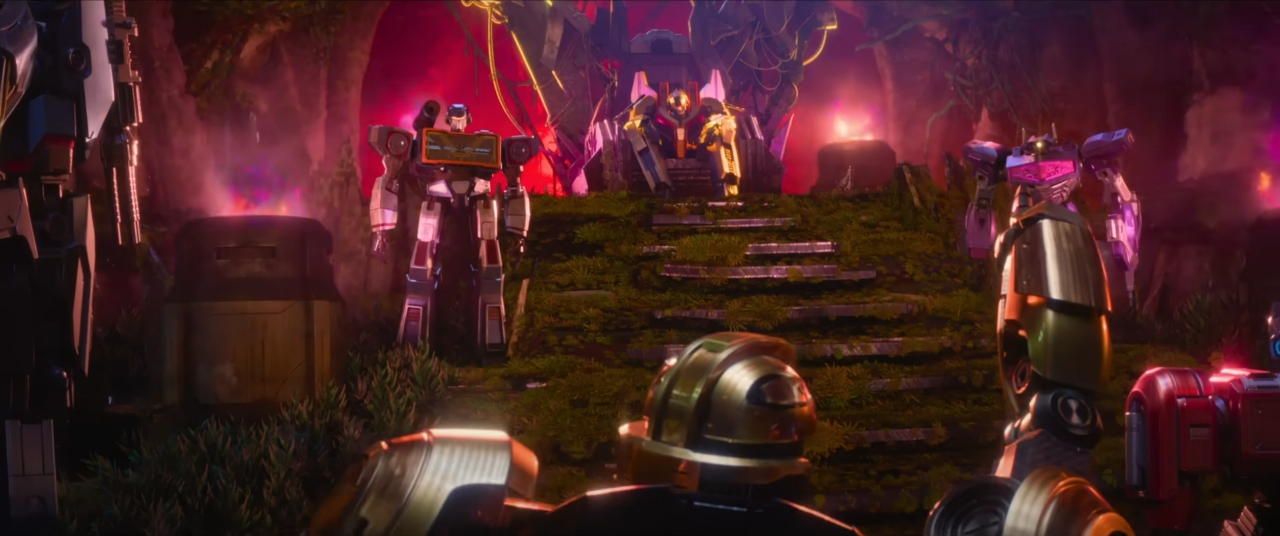
out of nowhere, our heroes are ambushed and brought offline, waking up in a scrap metal encampment before an awfully familiar lineup of captors - Starscream, Shockwave, and Soundwave, not to mention a dozen or so identical jet-type guys. Bee is quick to identify them as the Cybertronian High Guard, and Starscream, their captain, explains that they've been fighting on the surface ever since Sentinel's betrayal, pushing back against the Quintessons and making life difficult for the false Prime. quite clearly, though, they don't have what it takes to stage a full-scale war, only able to perform hit-and-runs while cowering in the shadows. having assumed that Orion and his crew are part of Sentinel's expedition, the High Guard quickly get to display their bloodthirsty philosophy as they prepare for an execution, launching us into yet another major D-16 moment to unpack.
as Starscream lays it out, the fall of the Primes and years to sit with this unresolved betrayal has taught the Guard to trust no one, and they've given in to a simplistic 'might makes right' approach to leadership... which gives D-16 the perfect opportunity to show off that growing darkness in him, as he challenges Starscream for the throne. it's a brief but rather intense fight - with Starscream getting to be a bit more like the little freak we all know he is, as he eggs D-16 on to keep hitting him harder and really make it hurt. it wouldn't be a proper Megatron and Starscream dynamic without a little bit of deeply toxic homoeroticism, of course. D-16 crushes Starscream's voicebox, giving Steve Buscemi's performance a sort of warbly filter that taps into a bit of the classic shrill Starscream voice, and without even thinking about it, manifests his fusion cannon for the first time against Starscream's head, finally seeming to go a little too far in their masochistic standoff. this crossing of the line, however, opens up the door for him to truly rally the High Guard around him, with the crowd chanting his name and Orion looking on in stunned silence.
Starscream's always at least a little interesting to unpack. it helps that he's one of the more malleable characters in the post-Binder landscape of Transformers - it doesn't seem like his history is quite as locked in as someone like Optimus or Megatron, because his archetype is much more about the present than the past, with his role as the classic schemer looking to usurp power. i really wasn't expecting to be so fascinated by One's take on him, though, and i really am, to the point where it's kind of a shame that this is his one true big moment in the story, even if it is such a crucial one for where this movie goes.
we've already seen D-16's worst impulses brought to the forefront, but this scene is what really calcifies his turn to me. his path through life has always been to keep his head down and largely look out for himself - Orion is his friend, and he cares, sure, but it's always about how he's going to suffer from the consequences of Orion's actions. one of the first times he seems to think about anything bigger than staying on-program in the mines is during the trek to Alpha Trion, when Orion correctly clocks that his friend is lost in thought about what he'll say to Sentinel when they deliver the Matrix. it gets played off as him being a bit of a fanboy, but his mind's not on what the Matrix will do in terms of restoring Cybertron, but what it'll do for him and his personal standing in the hierarchy.
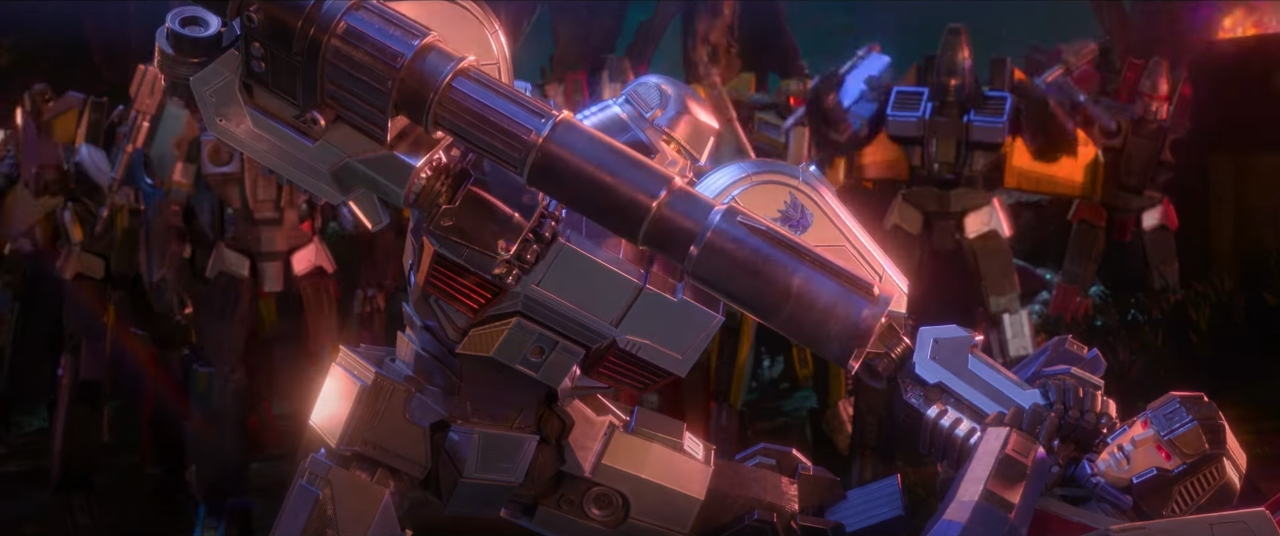
so, with that selfish streak already established, and with the pressure and heat thoroughly turned up from learning the truth about Sentinel, dropping him into a culture of individualistic fighters who seem to keep each other at arm's length and use senseless infighting as a mode of determining authority is like dropping a match in a powder keg. the reward structure of following Sentinel's rules and making it through another day of work has been stripped from D-16, and now, that vacuum has been filled by a reward structure where he's idolized for letting his frustrations loose and performing over-the-top violence against someone who's ultimately on the same side as him. D-16 hasn't allowed himself to want much, but in breaking out of his shell has gotten the approval he's always craved. his big moment of triumph and belonging comes from embracing cold, cruel individualism by way of his most unhinged instincts.
and this is really just me spitballing, because this isn't in the movie, but when you think about the track these characters are presumably on, the roles we can assume they'll settle into as this story transforms into the one we traditionally recognize - doesn't that kind of make this one of the most interesting takes on Starscream yet? Starscream has constantly been characterized by a desperate need for authority and a penchant for treachery, but in the context of Transformers One, he got like that because he gave power up. he USED to have authority, he USED to be the captain of the High Guard, but he got outplayed at his own game. his violent 'survival of the fittest' philosophy meshed all too well with D-16's tendency to look out for himself, and Starscream got outpaced by a fresh young outsider who could do it better than he did, and it'll one day presumably turn him into the pathetic snake we've all known and loved to hate for the last 40 years. that, to me, has potential written all over it.
really, a lot of this scene comes down to latent potential - it hits hard and they make the most of it, but the need to set the High Guard up at a relatively late point in the film makes it feel maybe just a little bit undercooked. there's some part of my brain that wonders if, in another world, you could have maybe trimmed down a bit of the Iacon 5000 or something in order to really draw this change in D-16 to the forefront just a bit more, or, alternatively, if this type of story might just be a little too big for one film. it doesn't ruin the pacing or anything, but i feel like i had to really latch onto this moment with analysis to draw the most out of it. the movie gets like, 80% of the way there to letting it speak for itself, but i worry that the cool things i'm spotting in this scene aren't going to land quite as universally as i feel like they ought to.
it doesn't help that ambush upon ambush leads into yet another ambush, as Airachnid launches a surprise attack on the High Guard's camp, capturing many of them (including D-16 and Bee) while leaving Orion buried in the wreckage. when Elita manages to dig him out, the two find that Alpha Trion's record of Sentinel's betrayal has been crushed in the midst of the battle, briefly leaving Orion hopeless until Elita gives him a begrudging pep talk, still emphasizing how she sees herself as very literally better than him while telling him why he has to be the one to fix this.
i've had a lot to say about D-16's arc over the course of the movie, and probably for a few different reasons. it's a much more outward and bombastic turn, with lots of interesting moments i can very specifically pin down as checkpoints as he changes from a hardline loyalist to the violent despot we know he will become. in general, villainous turns like this - especially those with a bit of tragedy in them - are a lot more fun for me to unpack. all the while, though, i've had a lot less to say about Orion Pax, and i think part of that is simply that this moment heading into the third act is where Transformers One really starts to clarify the journey he's on.
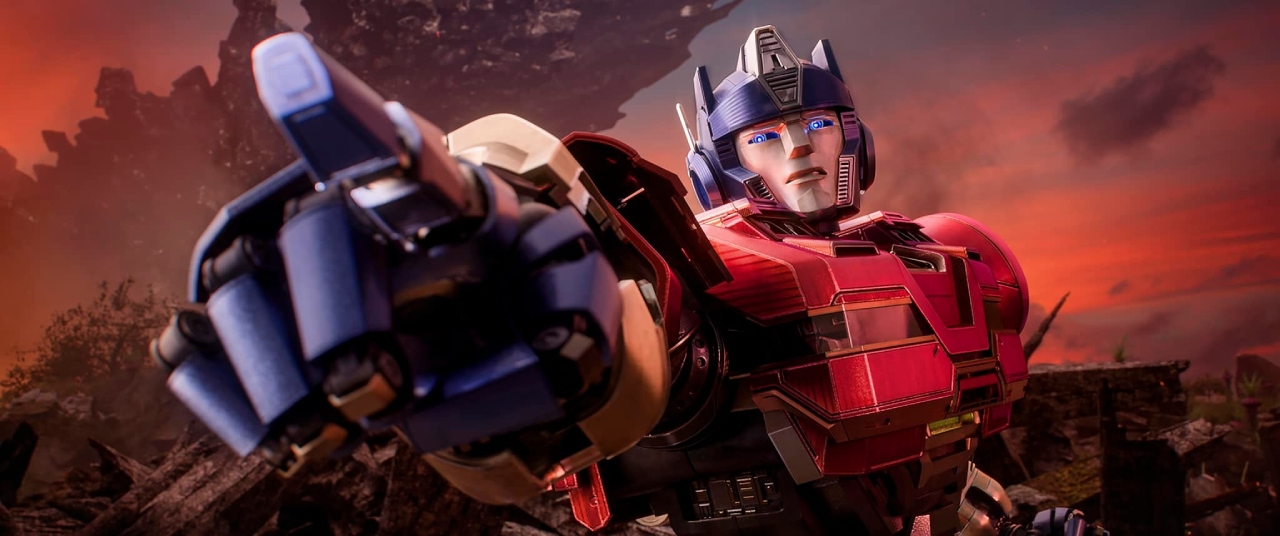
as Elita puts it, Orion's best trait is his optimism, his ability to "envision a better future that no one else can see". from the literal first scene of the movie, we've seen him dream big and break the rules, all in the hopes that a single miner from the lower castes might be able to crack some detail in the hunt for the Matrix that Sentinel hasn't figured out in '50 cycles', however long you want to interpret that as being. when faced with the layers upon layers of lies his entire world has been built upon, he's the first to step up to the plate and say something needs to be done, even if they have no chance of winning. i don't quite think this is the full extent of where this movie illustrates the fundamental ideological split that'll lead to Autobots vs. Decepticons, but it is an important stepping stone, and one that leads us to a triumphant first "transform and roll out" as Orion rallies what's left of the High Guard to head into Iacon for a final confrontation.
as Sentinel takes prisoners, all of that incoming pressure that's been building up around D-16 continues escalating more and more as he refuses to kneel before the false Prime. when he notices the Megatronus decal on D-16's shoulder, Sentinel goads more resistance out of his prisoner, taunting him by revealing that he took Megatronus's transformation cog for himself as a trophy, seemingly granting him some of the Prime's strength. to make matters worse, he opts to crudely carve the sigil into D-16's chest, daring him to 'rise up' for more punishment in a way that, for the right Transformers nerd who remembers when they were trying to give Megatron a parallel rallying cry to 'roll out', you know is about to boil over very badly.
meanwhile, Orion arrives back in Iacon, with Elita and the High Guard piloting an Energon transport into the city and towards Sentinel's tower - wow, didn't realize quite how that one sounds until i wrote it out just now, huh! his fellow miners are shocked to learn the truth of their leader's deception, and hesitant about if they'll be enough to let a full-scale assault, but Orion is quick to unite them with a speech, tapping into the wisdom Alpha Trion passed down to him and drawing on his solidarity with his caste. once again, credit to TFWiki for making it much easier for me to write about a movie i can't rewatch at will yet by transcribing this one -
one thing that wrting the dialogue down can't quite capture is that it's the first time in the film that you can really hear Chris Hemsworth's range extending past expectations and slipping into something with a little more weight and depth. it really fits the moment - one which i think finally helped me nail down Orion's perspective and arc in this story, as, much like with D-16 at the High Guard camp, the crowd begins cheering his name.
that ending phrase - "Together as one" - recurs throughout the script, usually delivered in a very specific tone that makes it feel like a very intentional nod to sort of self-justify the name of the film. it also doubles as an homage to the 1986 animated movie, which debuted the mantra "'til all are one" as a nice-sounding but ultimately somewhat generic thing for the Autobots to say during important moments. in this particular speech, though - in the context of this moment, as Orion Pax rises to the occasion and rallies his peers to fight for their freedom - i think the phrasing finally finds some steady footholds to become something a little more resonant with where the characters are at.
what Transformers One ultimately seems to convey as the defining ideological split between Orion and D-16 once they receive power is who they fight for, who they build their new vision of the future for. it's an incredibly pointed parallel that we have two scenes mirroring each other like this, moments where they tap into something they might not have known they had within themselves and find not just acceptance within a crowd, but are elevated to a higher station by the people around them. for D-16, that comes from embracing a selfish worldview, one that led him from bowing down to the rules for his own sake to establishing his stake at sole leadership through performative violence. and now, for Orion Pax, that has come from his optimism and care for others - the same impulse that drove him to volunteer in the hunt for the Matrix even if it meant breaking the law has now brought him here, where his belief in his community's ability to rise above expectations has made him a natural leader.
with the miners and the High Guard on the same page, the attack on Sentinel's tower can begin in earnest, coming just in time to delay D-16's execution. with the prisoners freed, D-16 is more than happy to keep things personal with a one-on-one, but Orion has other concerns about their nascent uprising - namely, the newly reopened opportunity to get their message out to all of Iacon, now that Airachnid has attacked and conveniently reminded him of her position as a surveillance expert (by revealing a massive configuration of eyes hidden in the back of her head - not sure how practical it is, but very cool). with a little help from Elita for this movie's prerequisite Girl Fight, Airachnid is plugged into the Iacon broadcast mainframe, exposing the truth of Sentinel's deal with the Quintessons to the entire city.
with his empire crumbling around him and D-16 unexpectedly putting up a pretty good fight despite the Megatronus-fueled upgrades, Sentinel quickly backpedals into promising that they can rule together, falling further and further on the back foot until D-16 has him dead to rights. Orion arrives back from his broadcast sidequest just in time to argue that they can't start rebuilding a better world by killing Sentinel, and all of the tension between the two friends finally starts breaking down as D-16 tries to throw Orion out of the way.
there's a term i throw around a lot as shorthand when talking about media with my friends - Riddler Syndrome, jokingly coined around 2022's The Batman, hopefully unrelated to Riddler's Brew. it's a common pitfall i notice in a lot of modern reinterpretations of major pop culture franchises, across company lines and genre. audiences want their interest in these franchises to be validated as a serious mode of storytelling, so writers try to inject additional layers of nuance and paint in shades of grey. perhaps the villain of the story - say, Paul Dano's take on the Riddler - has a good reason to be driven to evil, something that drives him beyond petty crime.
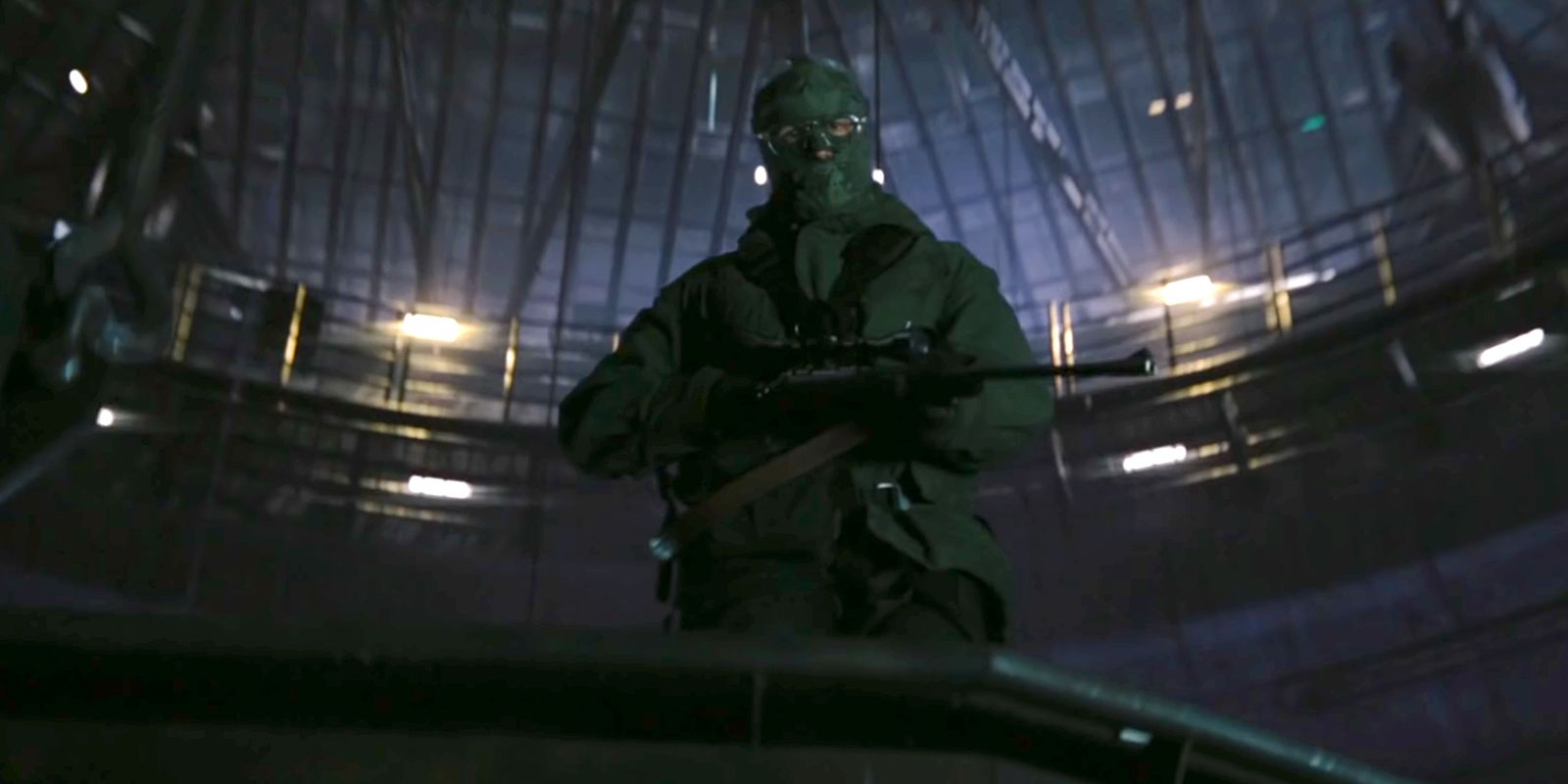
sometimes, this works out, but oftentimes, you see the dial turned too far. without getting into the nitty-gritty of another film entirely, Dano's Riddler is fighting against police corruption in Gotham City and threatening to reveal information that implicates the rich upper crust with cover-ups and organized crime. the problem the writers then run into is... that doesn't really bug a lot of people on a philosophical level, especially younger audiences who are very disillusioned with the real life systems being evoked to make Batman all serious.
so, Riddler Syndrome refers to the quick and sloppy shortcut you take to get the audience back on Batman's side - you inject needless cruelty into the villain. their somewhat noble cause is tainted by an increasing streak of indifference or even outright enjoyment towards the collateral damage their actions will bring upon innocent bystanders. their plan suddenly twists itself into knots to make sure there will be some kind of secondary cost to their deeds, and that secondary cost then justifies whatever happens to them, because they are now the bad guy who kills lots of people. in severe cases like Marvel's The Falcon and the Winter Soldier, this often goes hand-in-hand with the villain being killed themselves or otherwise permanently taken off the board, such that they can no longer make arguments in favor of the ideology that purportedly brought them to this point.
one of my absolute biggest concerns going into Transformers One was whether or not we'd be in for a heavy dose of Riddler Syndrome. it would be an extraordinarily easy mistake to make in this situation, for a number of reasons. on top of all the genre trappings that produce it, this is, ultimately, still at least sort of a kids' movie, which i assumed wouldn't have the deft hand to maneuver tricky ideological issues like this. furthermore, the idea that the Decepticon movement was born out of resistance to a corrupt Prime, and that Orion split off from D-16 because he preferred peaceful reform, is one of the most recurring elements of the Binder of Revelation and all its various offshoots. if we're playing this one by the literal book, all the big warning signs for Riddler Syndrome are there.
having now seen the movie, sat with it for a few days, and conveyed a lot of my thoughts into writing... i think One steers clear of a lot of major pitfalls, but doesn't necessarily avoid the issue entirely. for starters, i think it has a much better grasp on ideology than i was giving it credit for based on trailers and interviews - notice how i wrote several paragraphs about how selfishness and fear are the forces that mold D-16. he doesn't come out of nowhere with a noble cause to overthrow oppression, but is instead something of a passive participant in it, and it's those core building blocks of his personality that create the Megatron persona out of the vacuum left when his world's turned upside-down.
how this story frames the issue of class also helps. i'm not saying Transformers One is an especially deep study into working class empowerment, but oftentimes, when Riddler Syndrome pops up, part of the reason writers feel like they need it is because their hero is attached to systems they're framing as corrupt, whether that's Bruce Wayne's riches or Sam Wilson's dedication to American imperialism. if the villain is fighting against societal forces that both the story and audience can recognize as bad while the hero is benefitting from or enforcing those societal forces, people start asking uncomfortable questions, so you throw in that the villain goes too far and gets addicted to murder in a way that overwrites that and justifies retribution. Orion Pax and D-16 are both defined by the exact same lower caste background, and are both victims of oppression, which goes a long way in disarming any imbalance in what shapes their ideologies.
plus, it's not like Orion is exactly above all this either! he's the one fighting side-by-side with the soon-to-be Decepticons and rallying them to crash a train into Sentinel's headquarters! a lot of takes on this material characterize him as a data clerk and emphasize his hesitation towards violent uprising, but here, he's been breaking the law since minute one, and he's on the frontline just as much as D-16, with any tension really only coming to an unavoidable crescendo over whether or not having a public execution in the city plaza is the best way to start off a new era of Cybertronian history.
and, to make one final case for a way this movie dodges Riddler Syndrome, it helps that there's another thread where D-16 has lost his way aside from just wanting to kill Sentinel - the Matrix of Leadership. this whole journey started because Orion Pax wanted to find the lost artifact that could restore the flow of Energon to their world and improve life for everyone in Iacon, and now, D-16 has seemingly completely lost sight of that. there is a material way in which his uprising could be focused on raising people up, and he's turned inward to his own need for revenge. admittedly, this one is a bit of a stretch, because really, nobody's been bringing up the Matrix for a hot minute, so some of this could also be chalked up to a very busy script with a lot of things to cover.
and that, in turn, brings us to the one area where i definitely think One could have been better and does slip into some Riddler Syndrome - what is Orion Pax's idea for how you 'solve' the Sentinel situation? given what he's about to do in about 10 minutes or so, i think we can infer that the answer is probably 'exile him to the surface', but unless there's some dialogue that i need to refresh myself on with a second viewing, Orion never really voices that, or any other option. he thinks killing Sentinel is wrong, but the story doesn't paint an especially deep picture of what's right in that case, which is an unfortunate side-effect commonly found in Riddler Syndrome protagonists. i think giving Orion a moment to make even a bit more of a basic counterargument - maybe even throw in a 'let the Quintessons judge him', that'd be a nice nod to their kangaroo court in the 1986 movie while still fitting into the structure of this story - would go a long way in sealing the deal. all things considered, though? things could have wound up much worse.
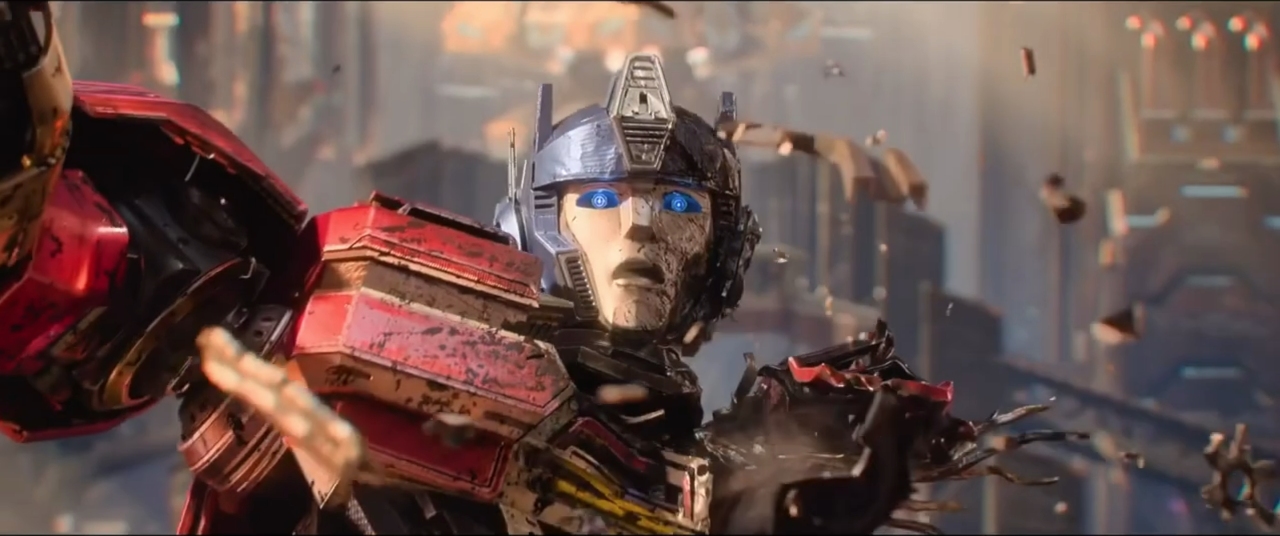
well, things could have wound up much worse in my specific deep reading of villainy vs. radicalization - in-universe, things have gotten about as bad as they can get, as Orion opts to take a fusion cannon shot instead of letting D-16 kill Sentinel, leaving him with a surprisingly gnarly hole punched through his entire torso and an arm missing. D-16 manages to catch him before he goes tumbling backwards into a massive chasm, and for a brief moment, you can hear just a bit of the concern he used to hold for Orion's safety slipping through when he asks why his friend would do this.
i'm not an especially huge fan of how the faces look and move in this movie - not the worst in the world, but there's something a smidge off about them - but i will give them credit for this particular moment. for just a few seconds, neither of them even have to say a word, as the camera focuses on D-16's face, silently and subtly changing from confusion to outright contempt. you can tell what's going on in his head as he fully accepts the truth that Orion simply isn't compatible with his worldview anymore. when Orion can barely choke out a "no", D-16 briefly looks down before re-establishing eye contact - now with the full-blown red optics needed to complete the Megatron look - and drops his best friend into the depths of Cybertron with a cold "I'm done saving you.".
what follows is, genuinely, an aesthetically beautiful sequence in a movie who's visuals i would have mostly described as 'pretty good' up until now. the sound design just lets the orchestra go off and speak for itself as we see two scenes play out in parallel - while Orion Pax falls through an increasingly abstract tunnel to the core of Cybertron, reeled in by a mysterious tendril of light, D-16 finally gets his hands on Sentinel, killing him by ripping him in half at the waist (remember when i qualified this as sort of a kids' movie?) before a crowd of cheering High Guard soldiers.
on the surface, D-16 rips Megatronus's cog from Sentinel's body and installs it in himself, while at the core, Orion Pax is greeted by the spirits of the Primes, with Alpha Trion conveying that Primus has deemed him worthy of carrying the Matrix of Leadership. one takes on the name Megatron, and the other is told to arise with new life as Optimus Prime. these two have truly completed their journeys to become the people they're going to be in their million-year intergalactic war, and it's time for the main event.
obviously, this movie has not been shy about portraying these two in parallel, but this scene hit pretty hard for me in terms of conveying the weight of this transformation in both of them. i still sort of prefer Orion Pax's speech of solidarity with the miners to the overt spirituality and 'greater good' stuff that Primus relays through Alpha Trion, but the framing of these two friends finally irrevocably splitting and both reaching the height of their power really helps make the obvious foregone conclusion of "hey, did you know that's Optimus and Megatron" still hit with a level of importance.
it helps that what follows is one of the coolest fights in Transformers history - there's a sadness to seeing things finally reach this breaking point, but if they're going to fight, you want Optimus and Megatron to feel like big deals, and they absolutely do. Optimus rockets back up to Iacon like a bolt of pure Energon as Megatron, high on robo-adrenaline and only bolstered by his radicalized militia, decides that Sentinel's legacy as a "false prophet" won't be truly buried until he and the High Guard burn his beloved city to the ground, along with anyone he deems complicit in upholding his facade... as in, basically anyone and everyone in said beloved city. careful there, D-16, you're showing early symptoms of Riddler Syndrome!
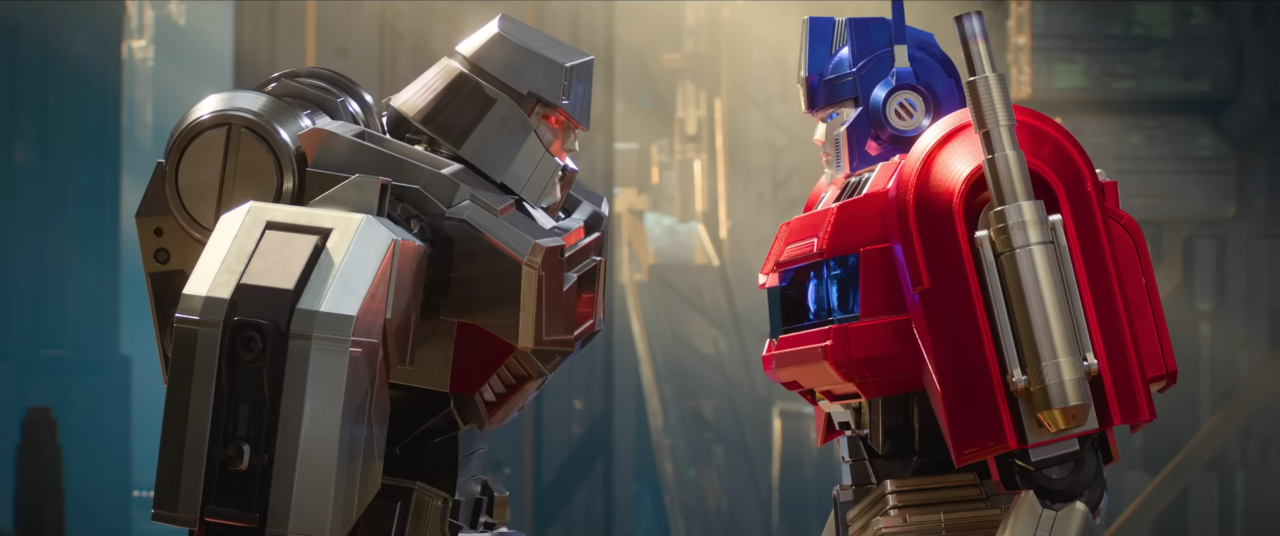
when Optimus finally re-emerges - just in time to save Bee and Elita from getting completely bodied by a freshly upgraded Megatron - his former friend can hardly believe that Orion is the one who's been granted the Matrix. they trade a few emotionally charged cuts-good-for-the-trailers words about how they "could have built the future together" before things quickly get intense. i know i mentioned this in vaguer terms while discussing the overall animation quality, but this fight really does flex the creativity this crew had when it came to working the character's mechanical nature into the flow of combat. it's hard to pinpoint just one moment, because this whole sequence is full of that stuff, but 'Optimus flips his head down into his truck cab pecs to avoid a barrage of shots from Megatron, who is currently grappling on top of him while Optimus uses his leg wheels to drive backwards' feels like it paints a pretty good mental picture. lots of rocket-powered punches and deployable cannons, and even an appearance from Optimus's energon axe, which in this take can now shoot out boomerang projections of itself like it's the sword from the original Zelda? neat.
ultimately, the fight comes to a standstill as Optimus slices through Megatron's fusion cannon. things seem tense enough to flare up even worse, especially knowing that both sides have essentially solidified into two armies staring each other down across Iacon's plaza, but Optimus wearily opts to exile Megatron and the High Guard to the surface of Cybertron, which his former friend bitterly accepts, at least for now. as Optimus watches Megatron drive up into the light pouring into Iacon, we get a brief flashback to the first time they met at their new mining job, where they promised to look out for each other, while our current Optimus laments that "some transformations are permanent".
and so, with the flow of Energon restored, transformation cogs granted to the mining caste (see how many G1 characters you can spot in this crowd, folks!), and Bee and Elita officially recruited as his trusted inner circle, One ends with Optimus leading the newly dubbed Autobots for a nice heroic jog on the surface. his voiceover frames this all through the lens of a warning against the Quintessons, in a fun nod to the traditional ending monologues of the live-action movies this is maybe, sort of, probably not a prequel to.
i've kind of danced around that for this whole overview, huh? Transformers One was initially born out of a writer's room established towards the tail-end of the Michael Bay-directed films, which has led to a lot of persnickety debates about its continuity. the creative forces behind this film gave lots of confusing contradictory answers that really mostly just dodged the question - just like with the last few live-action projects, which can't seem to decide whether they benefit from tying themselves to the 2007 film or need to run away from it - but as the release of One actually drew closer, everyone seemed to settle on the idea that it is its own thing. it makes a lot of sense, given things like Sentinel Prime dying here actively contradicting the live-action series, but also, those live-action movies contradict themselves literally all the time, so the whole thing is a little meaningless. given how much it taps into the Binder of Revelation, Transformers One can probably be a prequel to half the franchise, depending on how much wiggle room you're willing to give it.
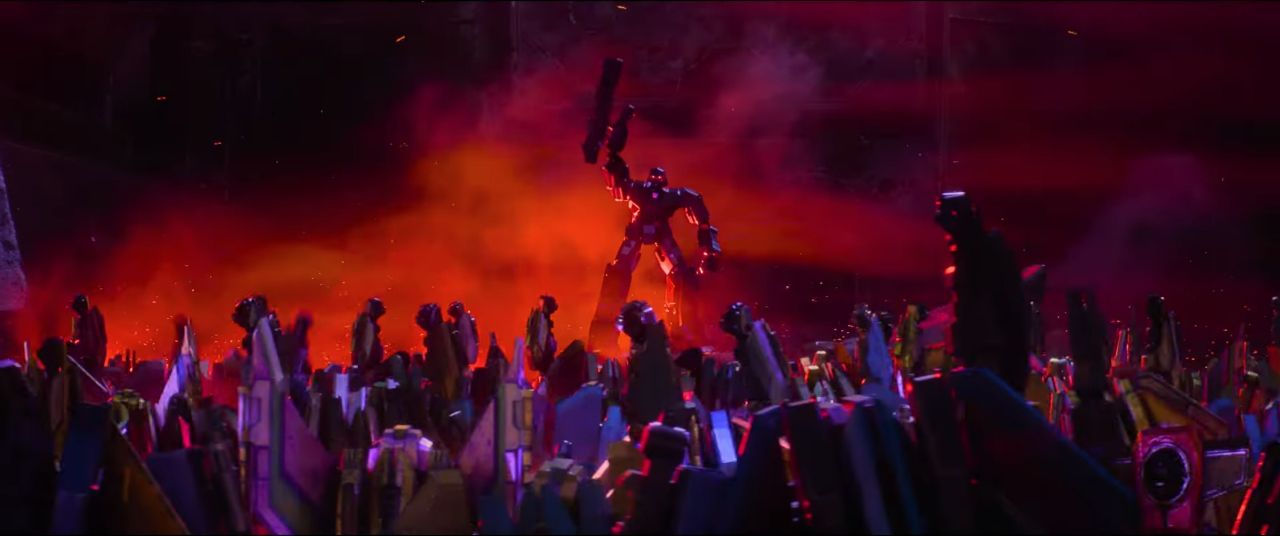
so, aside from one last Bee gag and a somewhat low impact post-credits stinger where Megatron finally coins the name 'Decepticon', that's a wrap on Transformers One. will we ever see these specific takes on the characters again, continuing their war against the Quintessons and each other, deepening the toxic yaoi between Megatron and Starscream and/or Optimus? if early box office numbers are any indication... honestly, probably not. unfortunately, One seems to have been a victim of rough circumstances, whether you want to attribute that to when it came out, how it was marketed (with a general focus on the film's more lighthearted aspects), people's general burnout on the Transformers franchise, or any number of even more intangible factors.
in a broader sense, though, i feel optimistic about what Transformers One does for the franchise. even if Hasbro and Paramount get scared of swinging big like this again, it is still, as i said at the top, a culmination of years of brand alignment. i don't like brand alignment - i think it stifles unique new takes on the storytelling DNA of any franchise. if it had to happen, though, and if we were always going to have to receive a fairly definitive text on the matter of the origin story, i'd much rather have Transformers One than what came before. if something is going to cast its long shadow as an influence over Transformers stories, i'm glad that something came out relatively well, dialing back basically every element that's traditionally bugged me about the Binder standards and focusing in on the actual interesting character beats to earn its tinge of tragedy.
none of this is to say that Transformers One is perfect. it is still, in many important ways, a kids' movie, with a script that can really only scratch the surface on some of its most interesting concepts. you might also notice that, of the film's primary cast of four, i really only pulled together a solid frame of analysis on two, and mostly just on one. i am definitely putting in some amount of effort to project depth into this thing based on my pre-established love for the franchise, and i'm not sure i could begrudge anyone who doesn't feel the same impulse to carry that weight and get really invested in D-16's arc. i would definitely say i would have made some different decisions about where time and focus were spent, and i'd go so far as to say this might have just needed to be told in a longer format to really hit its full potential, which is probably a pretty good argument for why comic books have been the medium of choice for exploring the deeper parts of this backstory and why, in turn, those comic books have now influenced this take on the material.
there's a couple of lines Sentinel Prime drops in his fight against D-16 about how in Iacon, the truth is what he makes it. i kind of skimmed over them because, while they stood out to me (and also feel incredibly JRPG-coded), i don't think there's quite enough meat on that bone to spin into a full-fledged take. maybe if you really, really want to stretch, 'the truth is what i make it' is a little venomous towards brand alignment or whatever? brand alignment is at the core of this whole project, though - not its heart, but maybe like, its liver or its kidneys or something. no, the heart is that Hasbro has finally given a talented team a lot of money to turn what used to largely amount to a list of facts we were arbitrarily expected to care about into a narrative you can actually invest yourself into, and a film that, at least at times, actually got me feeling things. and, ultimately, if Transformers One sticks around in the fandom consciousness, whether that's by way of an increasingly unlikely sequel, or if it's by becoming a somewhat kitschy and unpolished cult classic like the 1986 animated movie before it, i think that heart is in the right place.


